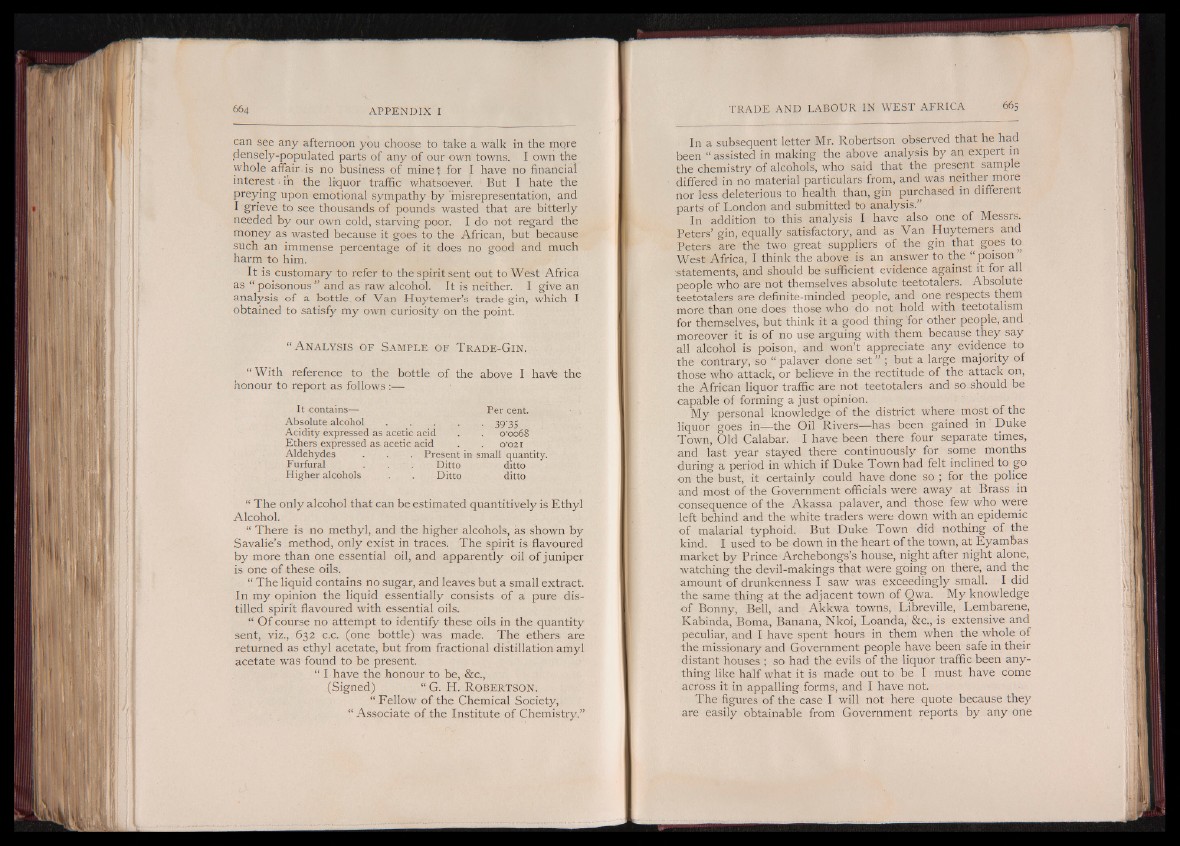
can see any afternoon you choose to take a walk in the mqre
densely-populated parts of any of our own towns. I own the
whole affair.is no business of mine* for I have no financial
interest > in the liquor traffic whatsoever. But I hate the
preying upon emotional sympathy by misrepresentation, and
I grieve to see thousands of pounds wasted that are bitterly
needed by our own cold, starving poor. I do not regard the
money as wasted because it goes to the African, but because
such an immense percentage of it does no good and much
harm to him.
It is customary to refer to the spirit sent out to West Africa
as “ poisonous ” and as raw alcohol. It is neither. I give an
analysis of a bottle, o f Van Huytemer’s trade-gin, which I
obtained to satisfy my own curiosity on the point.
“ A n a l y s i s o f S a m p l e o f T r a d e -G in .
“ With reference to the bottle o f the above I havte the
honour to report as follows :—
It contains— Per cent.
Absolute alcohol . . . . . 39'35
Acidity expressed as acetic acid . . o'oo68
Ethers expressed as acetic acid . . o-o2i
Aldehydes . . . Present in small quantity.
Furfural . . . Ditto ditto
Higher alcohols . . Ditto ditto
“ The only alcohol that can be estimated quantitively is Ethyl
Alcohol.
“ There is no methyl, and the higher alcohols, as shown by
Savalie’s method, only exist in traces. The spirit is flavoured
by more than one essential oil, and apparently oil of juniper
is one of these oils.
“ The liquid contains no sugar, and leaves but a small extract.
In my opinion the liquid essentially consists of a pure distilled
spirit flavoured with essential oils.
“ O f course no attempt to identify these oils in the quantity
sent, viz., 632 c.c. (one bottle) was made. The ethers are
returned as ethyl acetate, but from fractional distillation amyl
acetate was found to be present.
“ I have the honour to be, &c.,
(Signed) “ G. H. R o b e r t s o n .
“ Fellow o f the Chemical Society,
“ Associate o f the Institute of Chemistry.”
In a subsequent letter Mr. Robertson observed that he had
been “ assisted in making the above analysis by an expert in
the chemistry of alcohols, who said that the present sample
differed in no material particulars from, and was neither more
nor less deleterious to health than, gin purchased in different
parts of London and submitted to analysis.”
In addition to this analysis I have also one of Messrs.
Peters’ gin, equally satisfactory, and as Van Huytemers and
Peters are the two great suppliers of the gin that goes to
West Africa, I think the above is an answer to the “ poison”
statements, and should be sufficient evidence against it for all
people who are not themselves absolute teetotalers. Absolute
teetotalers are definite-minded people, and one respects them
more than one does those who do not hold with teetotalism
for themselves, but think it a good thing for other people, and
moreover it is o f no use arguing with them because they say
all alcohol is poison, and won’t appreciate any evidence to
the contrary, so “ palaver done set ” ; but a large majority of
those who attack, or believe in. the rectitude o f the attack on,
the African liquor traffic are not teetotalers and so should be
capable of forming a just opinion.
My personal knowledge o f the district where most o f the
liquor goes in— the Oil Rivers— has been gained in Duke
Town, Old Calabar. I have been there four separate times,
and last year stayed there continuously for some months
during a period in which if Duke Town had felt inclined to go
on the bust, it certainly could have done so ; for the police
and most of the Government officials were away at Brass in
consequence of the Akassa palaver, and those few who were
left behind and the white traders were down with an epidemic
o f malarial typhoid. But Duke Town did nothing o f the
kind. I used to be down in the heart of the town, at Eyambas
market by Prince Archebongs’s house, night after night alone,
watching the devil-makings that were going on there, and the
amount of drunkenness I saw was exceedingly small. I did
the same thing at the adjacent town o f Qwa. My knowledge
o f Bonny, Bell, and Akkwa towns, Libreville, Lembarene,
Kabinda, Boma, Banana, Nkoi, Loanda, &c., is extensive and
peculiar, and I have spent hours in them when the whole of
the missionary and Government people have been safe in their
distant houses ; so had the evils of the liquor traffic been anything
like half what it is made out to be I must have come
across it in appalling forms, and I have not.
The figures of the case I will not here quote because they
are easily obtainable from Government reports by any one